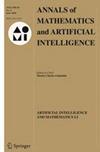信念-愿望-意图代理的算法调试方法
IF 1.2
4区 计算机科学
Q4 COMPUTER SCIENCE, ARTIFICIAL INTELLIGENCE
Annals of Mathematics and Artificial Intelligence
Pub Date : 2023-05-05
DOI:10.1007/s10472-023-09843-4
引用次数: 0
摘要
调试代理系统可能相当困难。在认知代理的开发过程中,调试往往是最耗时的工作之一。算法(或声明式)调试是一种半自动技术,调试器会向开发人员提出问题,以便找出错误的根源。我们将介绍如何将其应用于 BDI 代理语言,演示如何加快或简化调试过程,并对其优势和局限性进行思考。本文章由计算机程序翻译,如有差异,请以英文原文为准。
An algorithmic debugging approach for belief-desire-intention agents
Debugging agent systems can be rather difficult. It is often noted as one of the most time-consuming tasks during the development of cognitive agents. Algorithmic (or declarative) debugging is a semi-automatic technique, where the developer is asked questions by the debugger in order to locate the source of an error. We present how this can be applied in the context of a BDI agent language, demonstrate how it can speed up or simplify the debugging process and reflect on its advantages and limitations.
求助全文
通过发布文献求助,成功后即可免费获取论文全文。
去求助
来源期刊

Annals of Mathematics and Artificial Intelligence
工程技术-计算机:人工智能
CiteScore
3.00
自引率
8.30%
发文量
37
审稿时长
>12 weeks
期刊介绍:
Annals of Mathematics and Artificial Intelligence presents a range of topics of concern to scholars applying quantitative, combinatorial, logical, algebraic and algorithmic methods to diverse areas of Artificial Intelligence, from decision support, automated deduction, and reasoning, to knowledge-based systems, machine learning, computer vision, robotics and planning.
The journal features collections of papers appearing either in volumes (400 pages) or in separate issues (100-300 pages), which focus on one topic and have one or more guest editors.
Annals of Mathematics and Artificial Intelligence hopes to influence the spawning of new areas of applied mathematics and strengthen the scientific underpinnings of Artificial Intelligence.
 求助内容:
求助内容: 应助结果提醒方式:
应助结果提醒方式:


